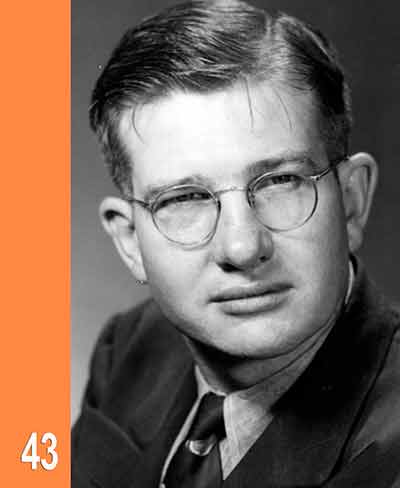Nat Caldwell
Induction Year:¬Ý2003
Lived:¬Ý1912-1985
Papers:
The Trenton Daily Bulletin; The Evening Tennessean; The Tennessean
During the years Nat Caldwell was at The Tennessean in Nashville, his reportage exposed labor-management corruption, strip mining abuses, nursing home maltreatment of the elderly, civil rights violations and government corruption at the federal, state and local levels.
With all that, he was known across the region of the Tennessee Valley as a journalist whose stories often reflected a positive tone. He was a crusading reporter, for example, on behalf of public power and community development. A former chairman of the Tennessee Valley Authority once said, "Nat Caldwell is responsible for more TVA and Corps of Engineers dams and lakes than any member of Congress."
Caldwell shared the 1962 Pulitzer Prize for national reporting with editorial writer Gene Graham for their six years of work revealing that the United Mine Workers were colluding mine-company management. The team exposed a sweetheart deal between John L. Lewis, president of the United Mine Workers, and Cyrus Eaton, the billionaire financier who had major interests in the coal fields.
Their series of articles (with both journalists' bylines) exposed how the deal robbed mine workers, many suffering from black lung disease, of their hospitalization.
Caldwell's work often drew sharp criticism. On one occasion, his newspaper had to provide police protection when a series of articles resulted in his being physically assaulted. On another occasion, the newspaper was sued for $1 million by a nominee for the TVA Board after a U.S. Senate Committee recited Caldwell's news stories as grounds for refusing to confirm the nomination.
A series of eight stories on the migration of millions of black and poor white people out of the South as a consequence of the anticipated mechanization of Southern agriculture, he said, was his "most significant" project. Charles S. Johnson, president of Fisk University, paid to charter a small plane for six weeks, and Caldwell covered the country, with side trips to Chicago, Des Moines and the Pacific Northwest. Caldwell interviewed black families who left Southern farms and migrated to military defense plants during World War II. Twenty-eight newspapers including the London Times, the Montreal papers, the New York Herald-Tribune and the Chicago Sun-Times published his work, and Newsweek, The Atlantic Monthly and Today magazines summarized the series.
Born July 16, 1912 in St. Charles, Missouri, he was the son of Tennessee natives and the grandson of a Tennessee Supreme Court justice. His first newspaper job was at The Trenton(Tenn.) Daily Bulletin in 1931. He joined The Evening Tennessean in 1934. Camilla Frances Johnson and Caldwell were married in 1936 and had one son.
For more than a half century, Caldwell produced outstanding public service journalism at The Tennessean and was a mentor to many young members of the staff. His work included investigative reporting, environmental reporting, political correspondence, feature writing and editorial writing.
In a dispatch from Beirut in 1949, Caldwell lamented the denial by the Iraqi consulate to give him a visa to visit Baghdad. He had joined a TVA chairman on a United Nations mission to consult on the refugee problem that had occurred after the war between Israel and the Arabs. He waited and interviewed a parade of officials in several Middle Eastern cities before filing his story. He captured an international feature story that resonates more than 50 years later and provided a portrait of conflicts to come.
